
Winchester is a cathedral city in Hampshire, England. The city lies at the heart of the wider City of Winchester, a local government district, at the western end of the South Downs National Park, on the River Itchen. It is 60 miles (97 km) south-west of London and 14 miles (23 km) from Southampton, its nearest city. At the 2021 census, the built-up area of Winchester had a population of 48,478. The wider City of Winchester district includes towns such as Alresford and Bishop's Waltham and had a population of 127,439 in 2021. Winchester is the county town of Hampshire and contains the head offices of Hampshire County Council.

The Cathedral Church of the Holy Trinity,Saint Peter, Saint Paul and Saint Swithun, commonly known as Winchester Cathedral, is the cathedral of the city of Winchester, England, and is among the largest of its kind in Northern Europe. The cathedral is the seat of the Bishop of Winchester and is the mother church for the ancient Diocese of Winchester. It is run by a dean and chapter, under the Dean of Winchester.

Swithun was an Anglo-Saxon bishop of Winchester and subsequently patron saint of Winchester Cathedral. His historical importance as bishop is overshadowed by his reputation for posthumous miracle-working. According to tradition, if it rains on Saint Swithun's bridge (Winchester) on his feast day it will continue for forty days.

Stavanger Cathedral is Norway's oldest cathedral and the seat of the Bishop of Stavanger who leads the Diocese of Stavanger in the Church of Norway. It is located in the centre of the city of Stavanger which lies in the southwestern part of the large Stavanger Municipality in central Rogaland county, Norway. The church is situated in the centre of the city, in the borough of Storhaug between Breiavatnet in the south, the square with Vågen in the north west, the cathedral square in the north, and Kongsgård in the southwest.

Buttermere is a small village and civil parish on the eastern boundary of Wiltshire, England, about 4.5 miles (7 km) south of Hungerford and 10 miles (16 km) southeast of Marlborough. The village stands above the steep escarpment of Ham Hill, and at 257 metres (843 ft) above sea level it is the highest village in Wiltshire and probably the highest in Wessex.

Martyr Worthy is a small village and former civil parish, now in the parish of Itchen Valley, in the Winchester non-metropolitan district of Hampshire, England. It is part of the Worthys cluster of small villages. In 1931 the parish had a population of 350. On 1 April 1932 the parish was abolished to form Itchen Valley.

The Old Minster was the Anglo-Saxon cathedral for the English diocese of Wessex and then Winchester from 660 to 1093. It stood on a site immediately north of and partially beneath its successor, Winchester Cathedral.
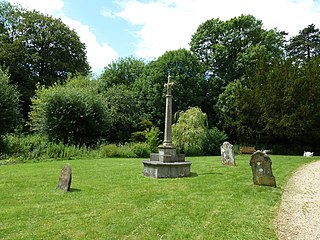
Headbourne Worthy is a village and former manor within the City of Winchester district of Hampshire, England. The parish also includes the former manor of Worthy Pauncefoot.
St Swithun's Church, named after St Swithun who was an Anglo-Saxon bishop of Winchester, can refer to numerous churches:
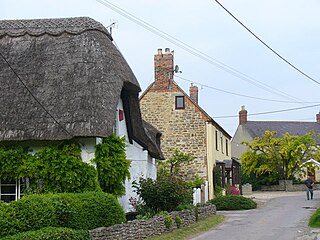
Hinton Parva, also known as Little Hinton, is a village in the Borough of Swindon in Wiltshire, England. It lies about 2 miles (3.2 km) from the eastern edge of the Swindon built-up area, and is separated from the town by farmland and the village of Wanborough. The village has a Grade I listed church which has Norman origins. Hinton Parva was a separate civil parish until 1934, and is now in the parish of Bishopstone.

St Swithun upon Kingsgate is a Church of England church in Winchester, Hampshire, England, built in the Middle Ages in the Early English style. Located above the medieval Kingsgate, one of the principal entrances to the city, the church is unusual in forming a part of the fabric of the old city walls. St Swithun's first appears in 13th century records, and under the fictional name of St Cuthbert's, is mentioned in Anthony Trollope's novel The Warden.

The Westgate is one of two surviving fortified gateways in Winchester, England formerly part of Winchester City Walls. The earliest surviving fabric is of Anglo-Saxon character. The gate was rebuilt in the 12th century and modified in the 13th and late 14th centuries, the latter including a portcullis in the western façade and two inverted-keyhole gunports, the earliest in the country. The gate was in use until 1959 when the High Street was routed around it.

St Lawrence Church is a parish church in the Church of England in Winchester.
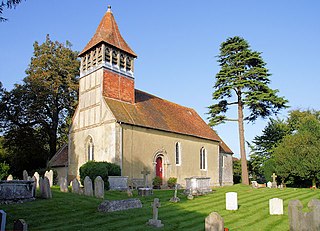
St Swithun's Church, Martyr Worthy is a Church of England parish church in Martyr Worthy, Hampshire, England.

Itchen Stoke and Ovington is an English civil parish consisting of two adjoining villages in Hampshire, England, 2 miles (3.2 km) west of Alresford town centre in the valley of the River Itchen, 5 miles (8.0 km) north-east of Winchester, and 2 miles (3.2 km) south-east of Itchen Abbas.
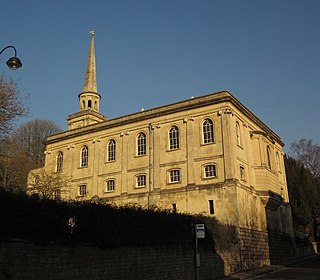
The Anglican Church of St Swithin on The Paragon in the Walcot area of Bath, England, was built between 1777 and 1790. It is a Grade II* listed building.

St Swithun's Church is a Grade II listed church in the town of Bournemouth, England.
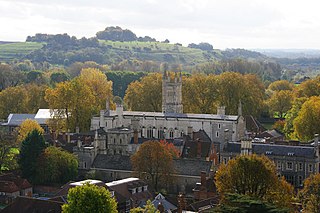
Winchester College is an English independent boarding school for pupils aged 13 to 18. Its original medieval buildings from the 1382 foundation remain largely intact, but they have been supplemented by multiple episodes of construction. Additions were made in the medieval and early modern periods. There was a major expansion of boarding accommodation in the Victorian era; further teaching areas were constructed at the turn of the 20th century and more recently.


















